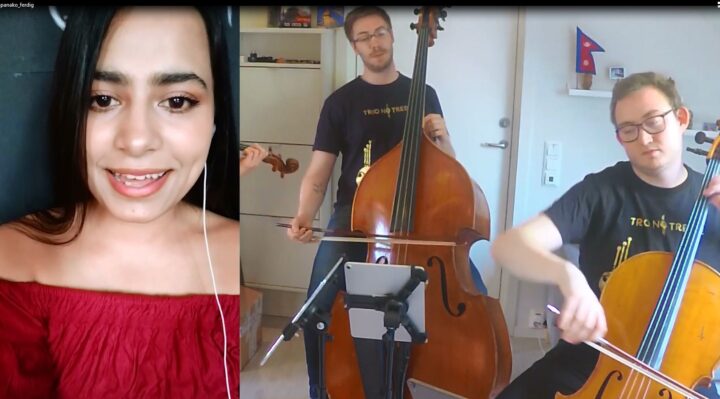When singer Rachana Dahal met musician Eivind Rossback Heier at a concert at the Norwegian Embassy in Kathmandu in October last year, they immediately hit it off and talked about collaborating.
Then the pandemic struck, and Heier’s plans to return to Nepal for the sixth time to continue his orchestra project had to be put on hold. But Heier did not let a lockdown come between them, and contacted Rachana Dahal.
Dahal, 22, is an up-and-coming singer who has moved on from performing covers at venues in Kathmandu to composing originals with her own lyrics, and music during the long months of the lockdown in Nepal.

In Norway, Heier is now playing in a string trio called Trio: No Treble and has been recording ‘quarantine videos’ since the beginning of the global lockdown in March. With support from the Norwegian Art Council, the trio has conducted digital concerts in separated rooms, and have got Norwegian guest artists, including opera singers and violin players to participate remotely.
But for something different, Heier contacted Rachana Dahal and asked her if she would be interested in an intercontinental internet concert linking Nepali and Norwegian musicians.
“Rachana has a fantastic voice,” Heier said in an interview from Oslo. “It’s great that we can make music together over the Internet, despite the corona. I hope we can do more of that kind of collaboration with Nepali musicians, since we cannot come to Nepal this year.”
“I was so surprised by the invitation, and was glad to take on the challenge,” says Dahal, who decided to sing her new song, Sapanako Raja. The result is an almost opera-like classical fusion that is uplifting in its message for the troubled times the world is in.
The original full version of the song, far from being a yearning for a knight in shining armour coming to lift and carry away a young woman, has the message of empowerment for Nepali women – one that will resonate at a time when the Supreme Court reduced the life sentence of a police officer who killed his wife eight years ago, and there was another acid attack on a woman in Kathmandu on Friday.
Rachana Dahal’s lyrics are an eruption of suppressed emotions from the trauma of being sexually molested by her teacher from Grade 3 onwards for two years in a school in Lalitpur. For years, she kept the crime hidden from her family and friends, but finally decided to go public after hearing of others who had gone through the same abuse.
“After keeping it locked up in me for so long, I finally found that I could turn my pain into power through music,” Dahal said, “I finally had the freedom to fly, and writing songs became an outlet for me.”
After giving up cover gigs, Dahal has come out with many other songs like Bhumari (Whirlpool) mixing powerful lyrics with a free-wheeling almost jazz-like sound.
Back in Norway, Heier says Trio: No Treble had a lot of spring concert cancellations because of the coronavirus, including tours of Sweden and Russia. The ‘quarantine videos’ were a way for the trio to perform separately from home and edit the final version of the classical, film or pop music together.
“Rachana and I met randomly in Nepal last year, and I was struck by her charisma, hospitality, and she was such a welcoming person,” Heier recalls. “I then listened to her on YouTube, and I fell in love with her beautiful voice. Since the borders are closed, we are lucky to be able to interact and play together across the borders.”
During his trips to Nepal, Heier found Nepali folk music fascinating and enjoys playing Narayan Gopal and Amber Gurung hits. The trio asked Dahal to choose any song she wanted, and she selected her latest release Sapanako Raja.
“It is a perfect song to do with strings, we made the arrangement of her song ourselves, and it is quite difficult to do a concert separately over the internet mostly because we can’t hear each other live. So it takes some time to get used to it, but it’s also a good exercise,” says Heier, who is the only one in the trio who has been to Nepal.
But he says recording a concert separately over the Internet cannot be compared to performing to a live audience. He adds: “You get a lot of energy by playing in front of audience, and that inspiring energy you will never get from playing in front of a camera. That is why I hope one day soon we can come to Nepal to play concerts with Rachana.”
